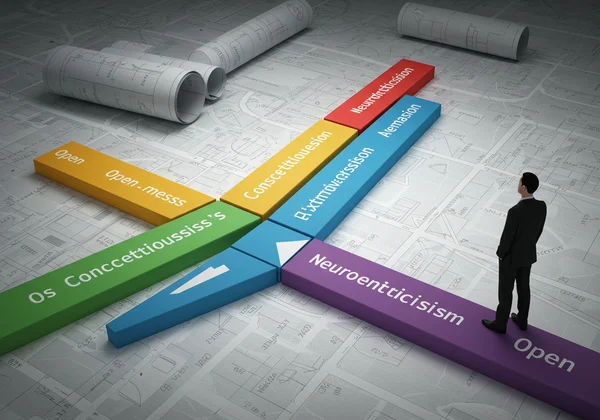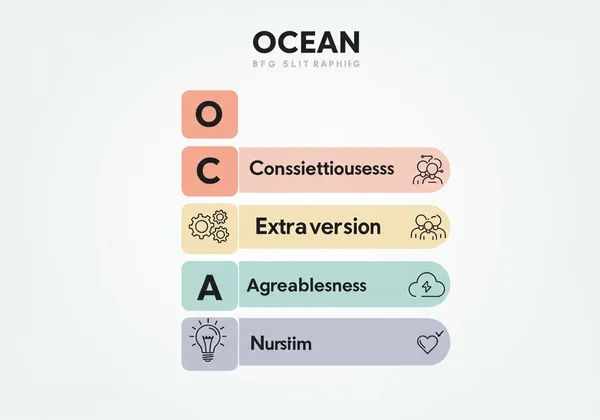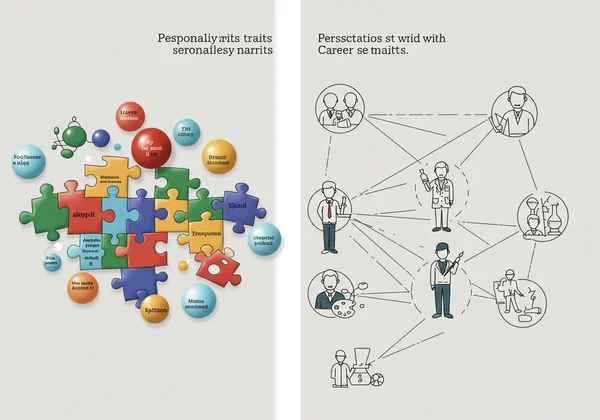Big 5 Traits: Shaping Your Ideal Career Path
Feeling adrift in your career? You're not alone. Many professionals find themselves in jobs that drain their energy and leave them unfulfilled, wondering if there's a role out there that truly fits. The secret to finding a satisfying career isn't just about skills or salary; it's about alignment with your core personality. This is where the Big 5 Personality Test becomes an invaluable tool for self-discovery and career planning. What is the Big 5 personality test, and how can it illuminate the path to your ideal job?
This guide will walk you through the scientifically validated Big 5 model, helping you understand how your unique traits influence your professional success and satisfaction. By understanding your personality blueprint, you can move from guessing to knowing what kind of work will truly make you thrive. Ready to begin your journey? You can take the free test to discover your unique profile.

Understanding Your Big 5 Personality Traits & Career Impact
Before you can map your career, you need to understand the mapmaker: your personality. The Big 5 model is not another fleeting online quiz; it's a robust framework trusted by psychologists for decades to describe the fundamental building blocks of personality. It provides a reliable language to discuss who we are and how we interact with the world, especially the world of work.
What Are the Big 5 Personality Traits (OCEAN)?
The Big 5, often remembered by the acronym OCEAN, outlines five broad dimensions of personality. Each trait exists on a spectrum, and your unique combination of scores creates a detailed personality profile. The five factors are:
-
Openness: This trait reflects your curiosity, creativity, and appreciation for new experiences. High scorers are imaginative and adventurous, while low scorers are more conventional and prefer routine.
-
Conscientiousness: This dimension measures your level of organization, discipline, and goal-directed behavior. High scorers are reliable and hardworking, whereas low scorers are more spontaneous and flexible.
-
Extraversion: This trait relates to your sociability and energy level in social situations. High scorers (extraverts) are outgoing and energetic, drawing energy from others. Low scorers (introverts) are more reserved and recharge through solitude.
-
Agreeableness: This reflects your tendency to be compassionate and cooperative. High scorers are trusting and helpful, prioritizing social harmony. Low scorers are more competitive and analytical, comfortable with conflict.
-
Neuroticism: This dimension relates to emotional stability. High scorers are more prone to stress, anxiety, and mood swings. Low scorers are typically calm, secure, and resilient under pressure.

Why Your Traits Are Key to Workplace Satisfaction & Performance
Understanding these traits is more than an academic exercise. Research consistently shows that a good fit between your personality and your job environment is a strong predictor of job satisfaction, performance, and long-term career success. When your daily tasks align with your natural inclinations, work feels less like a chore and more like a calling.
For example, a highly conscientious individual might feel stressed in a chaotic, unstructured startup but excel in a role that requires meticulous planning, like project management. Conversely, someone high in openness might feel stifled in a highly regulated corporate job but thrive in a creative field like design or research. By learning your profile, you can start to understand your traits and make deliberate choices that lead to a more fulfilling professional life.
Aligning Your Big 5 Profile with Your Ideal Career Path
Once you have a grasp of the five dimensions, the next step is to connect them to specific careers. While no single trait dictates your destiny, your dominant characteristics can point you toward roles and environments where you're most likely to flourish.

Openness: Innovators, Creators & Problem Solvers
Individuals high in Openness are driven by curiosity and a desire for novelty. They are the artists, scientists, and entrepreneurs of the world. If you score high here, look for careers that involve creative thinking, abstract ideas, and constant learning.
- Ideal Careers: Graphic Designer, Scientist, Journalist, Entrepreneur, Marketing Strategist, Software Developer.
- Work Environment: A dynamic, flexible setting that encourages experimentation and values unconventional ideas. Avoid rigid, bureaucratic workplaces.
Conscientiousness: Organizers, Planners & Detail-Oriented Professionals
Conscientiousness is one of the strongest predictors of job success across almost all fields. High scorers are dependable, organized, and thorough. They excel in roles that require precision, planning, and follow-through.
- Ideal Careers: Accountant, Project Manager, Surgeon, Lawyer, Data Analyst, Airline Pilot.
- Work Environment: A structured environment with clear expectations and goals. Roles that offer autonomy and responsibility for outcomes are highly motivating. You can discover your profile by taking our free test.
Extraversion: Networkers, Leaders & Engaged Communicators
Extraverts are energized by social interaction and thrive in roles that put them in the spotlight. They excel at building relationships, persuading others, and leading teams. If you're an extravert, seek out collaborative and people-focused careers.
- Ideal Careers: Sales Manager, Public Relations Specialist, Event Planner, Teacher, Politician, Human Resources Manager.
- Work Environment: A lively, team-oriented workplace with plenty of opportunities for collaboration and communication. Remote or isolated roles may feel draining.
Agreeableness: Collaborators, Supporters & Harmonizers
High Agreeableness indicates a strong inclination toward cooperation and helping others. These individuals are natural team players who foster positive and harmonious work environments. They find deep satisfaction in roles centered on service and support.
- Ideal Careers: Nurse, Counselor, Teacher, Customer Service Representative, Social Worker, HR Specialist.
- Work Environment: A collaborative, non-competitive culture that values teamwork and empathy. Highly political or cutthroat environments can be extremely stressful.
Neuroticism: Navigating Stress & Building Resilience in Your Role
High Neuroticism, or low emotional stability, means you are more sensitive to stress and emotional triggers. This is not a weakness but a trait to be managed. The key is finding a role with a predictable and supportive environment that minimizes common workplace stressors.
- Ideal Careers: Roles with clear tasks and lower interpersonal conflict, such as a Librarian, Technical Writer, Researcher, or Archivist.
- Work Environment: A calm, stable, and supportive workplace is crucial. High-pressure, fast-paced environments with constant deadlines can lead to burnout. Understanding this trait allows you to build resilience and coping strategies.
Practical Strategies for Big 5 Career Planning & Development
Knowing your Big 5 profile is just the beginning. The real power comes from using these insights to take concrete action. Here’s how you can translate your results into a tangible career plan.
Self-Reflection: Interpreting Your Big 5 Personality Test Results
When you get your results, don’t just look at each score in isolation. Consider how your traits interact. Are you a highly conscientious introvert? You might be a brilliant researcher. Are you an agreeable extravert? A career in non-profit fundraising could be a perfect fit. Reflect on your past jobs: When did you feel most energized and effective? Which tasks drained you? Your answers will likely correlate strongly with your personality profile.

Researching Careers That Match Your Unique Big 5 Profile
Use your profile as a filter to explore potential career paths. Look for job descriptions that emphasize tasks and responsibilities you’d naturally enjoy. For example, if you are low on Agreeableness and high on Conscientiousness, a role like a financial auditor or systems analyst, which requires objective, critical thinking, might be more suitable than a caregiving role. Use online resources like O*NET OnLine to explore occupations based on required skills and work styles. This is a practical step to find your career path.
Developing Skills & Adapting for Career Growth
Your personality isn't set in stone, and it doesn't limit you. Instead, it provides a roadmap for personal development. If you are an introvert wanting to move into leadership, you don’t need to become an extravert. Instead, you can focus on developing skills for public speaking and running structured meetings. If you are low on Conscientiousness, you can implement systems and tools to improve your organization and reliability. Your personality insights empower you to leverage your strengths and strategically manage your challenges.
Your Path to a Fulfilling Career: Insights from the Big 5
Your career journey is a significant part of your life, and finding true fulfillment means more than just a job; it means discovering a path that genuinely resonates with who you are. Instead of leaving this crucial decision to chance or external pressures, leverage the proven insights of the Big 5 Personality Test. It acts as a powerful mirror, revealing your inherent tendencies, strengths, and unique areas for growth, guiding you toward a profession where you can authentically thrive and contribute your best.
By understanding your unique profile, you can identify work that not only pays the bills but also energizes and fulfills you. You can build a career path that feels authentic and sustainable. The clarity you gain is the first step toward unlocking your full professional potential.
Ready to stop guessing and start knowing? Start your test now to receive a free, comprehensive analysis of your personality and take the first step toward a more satisfying career.
Frequently Asked Questions About Big 5 & Career Planning
How can Big 5 results help me choose a career?
The Big 5 results act as a compass, not a map. They don't give you a single "perfect job" but instead point you toward career fields and work environments where your natural traits are an asset. By understanding if you're more introverted or extraverted, conscientious or spontaneous, you can filter out roles that would likely cause stress and focus on those that align with your core disposition, leading to greater satisfaction and performance.
Is the Big 5 Personality Test scientifically valid for career guidance?
Absolutely. The Big 5 Personality Test, based on the Five-Factor Model, is one of the most empirically validated and reliable personality assessments in psychology. Decades of research support its stability and its ability to predict important life outcomes, including job performance and satisfaction. It is widely used by psychologists and career counselors as a trustworthy tool for professional guidance. Taking our scientific test ensures you get reliable insights.
What's the best personality test used by psychologists for career advice?
While several assessments exist, many psychologists consider the Big 5 personality assessment tool the gold standard for non-clinical purposes like career counseling. Unlike some popular typological tests (like the Myers-Briggs), the Big 5 is based on trait dimensions, which provides a more nuanced and scientifically robust picture of an individual's personality. Its focus on stable, measurable traits makes it exceptionally useful for aligning individuals with suitable career paths.